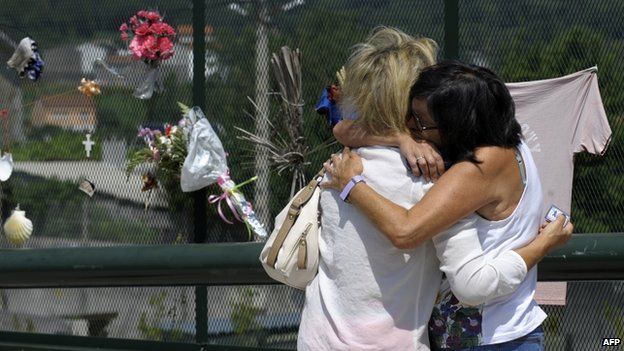Santiago rail crash: Families want answers one year on
- Published

A year after a high-speed train derailed on the outskirts of the Spanish city of Santiago de Compostela, survivors and relatives of some of the 80 people who died accuse current and previous Spanish governments of having failed to prevent the accident.
They say Spanish politicians have lied and are stopping the true causes of the crash from being properly investigated.
"The pain does not heal easily," says Santiago Fernandez, as he remembers a phone call from his sister on that fateful evening.
His father, brother and sister-in-law had been travelling on a train that had derailed on the outskirts of Santiago.
"She said not to worry because it probably was not that serious because the train had been near the station [when it crashed]," he says.
However, Mr Fernandez got straight into his car and drove north towards Galicia.
He kept calling his relatives' phones. but there was no answer.
And he listened to the news on the radio, as the official death toll rose.
Key concerns
The victims acknowledge that the failure of train driver Francisco Jose Garzon to brake in time, before the bend where it derailed, means that human error was an important factor but they believe the authorities in Galicia and in Madrid were quick to point the finger of blame at him.
They say this was part of a cynical strategy to draw attention away from the lack of an automatic braking system on the stretch of track in question.
Also, in September 2011 - not long before a general election - Spain's then-Socialist government announced that the new "high-speed" train line linking Galicia to Madrid was opening. However, soon after last year's crash, senior government figures and the boss of the company that runs Spain's rail infrastructure were quoted in the Spanish press as stating that it was not a high-speed train.
The victims say the Spanish authorities do not want the crash to be labelled as "high-speed" because it could endanger lucrative contracts enabling Spain's public rail company to build high-speed rail lines abroad, in places like Saudi Arabia.
"Each time they spoke about the dead, my heart stopped," he recalls.
His 69-year-old father, Isidoro Fernandez, was killed in the crash, as was his sister-in-law Marta Jimenez, aged 30. His brother Isidoro was injured but survived.
'Abandoned'
When Luis Buitrago and his wife watched the images of the twisted mess of train carriages on television, they told themselves that their daughter Olga was still alive.
They imagined her helping the other passengers.
However 28-year-old Olga, a crew member on board the ill-fated Alvia 04155 train, was among the 80 people who lost their lives.
"She had her life ahead of her," says Mr Buitrago. "It is all so sad. We think this accident could have been avoided. They don't want us to know the truth."
The couple's grief is still raw, as is their sense of anger towards politicians.
"No-one has supported me or my family," says Mr Buitrago. "We are still waiting for answers. We want the truth, not lies."
He describes the decision by the Spanish government not to hold an independent parliamentary enquiry into the crash as "pathetic".
"We feel abandoned by politicians," he says.
Long inquiry
The government says a committee of members of Spain's parliament is currently carrying out a study of the country's railway network.
The government also points out that an investigation into the crash has already been carried out by Spain's railway accidents commission.
However, victims say that investigation was not independent because it was carried out by people working for the ministry of infrastructure.
The crash is being investigated by a judge, but the investigation could take several years.
Jose Francisco Garzon, the driver of the train, which was travelling at 190km/h (118 mph) on a bend where the speed limit was 80km/h, is an official suspect in the case.
Former employees at Spain's public rail company Adif are also being investigated, especially over why the stretch of track where the train derailed had no automatic braking system.
"They are just trying to put all the blame on the driver but more people are responsible," says Santiago Fernandez.
Luis Buitrago, believes there is pressure on the investigation because politicians worry that the findings could damage contracts for Spain's public rail company to build high-speed rail abroad.
"I want my country to export [high-speed rail] all over the world," says Mr Buitrago. "But I also want justice to treat everyone equally."
'Stay away'
A ceremony will be held at the crash site on the edge of Santiago to mark the one-year anniversary of Spain's worst rail disaster in living memory.
The group of survivors, and relatives of victims of the crash, have called on members of Spain's two main political parties to stay away.
In a strongly worded statement, the group have accused the government and the country's public rail and train companies of a "sheer lack of co-operation" with the judicial investigation.
They say some members of Spain's public rail company have refused to be questioned by the investigating judge and that the government has failed to provide documents to the judge.
It is an accusation that Spain's government rejects. It says it respects and has fully collaborated with the judicial investigation and that, together with Spain's public rail and train companies, it has provided all the necessary documents to the judge.
- Published6 September 2013
- Published25 July 2013
- Published25 July 2013
- Published25 July 2013